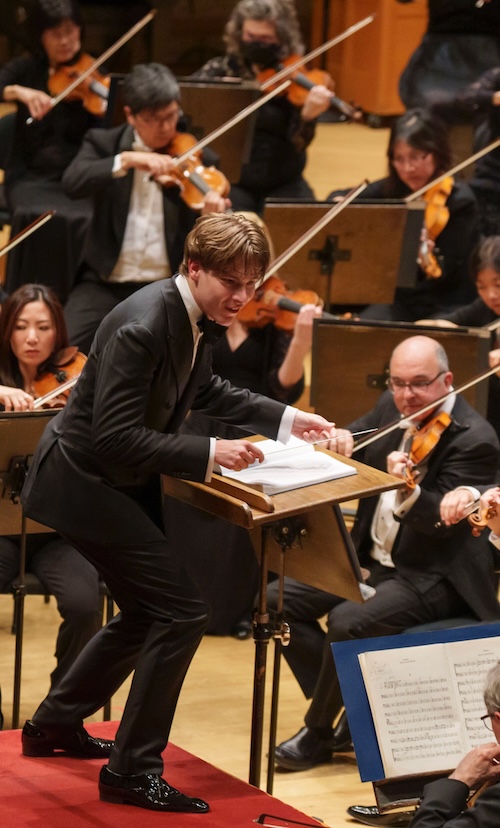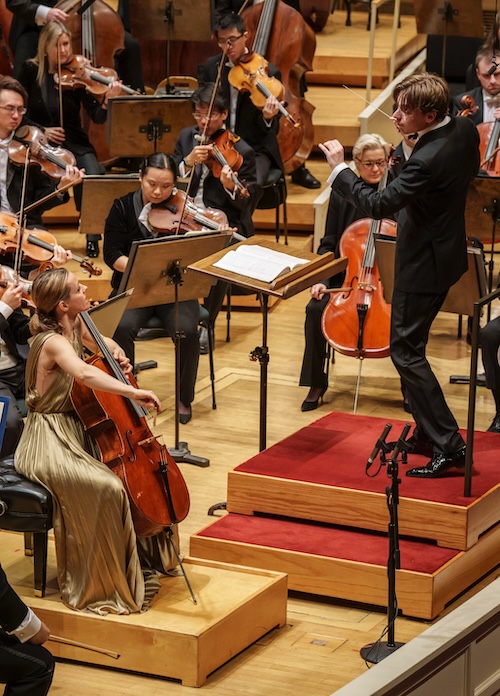Tapped as Chicago Symphony music director, Klaus Mäkelä makes an exhilarating stand with Shostakovich

Klaus Mäkelä was announced as the future music director of the Chicago Symphony Orchestra this week, effective in 2027. Yet the Finnish conductor remains something of an enigma to local audiences, having only appeared with the orchestra on two previous occasions (in 2022 and 2023).
Even so the 28-year-old maestro was welcomed upon his entrance Thursday night at Orchestra Hall with thunderous cheers and a standing ovation. The clamorous reception likely would have continued, but, after a brief acknowledgment, the music director designate quickly got down to business, turning to face the orchestra and lead the U.S. premiere of Sauli Zinovjev’s Batteria.
One of the most encouraging aspects of Mäkelä’s local appearances is that he has included a major contemporary work at every concert. That’s a far cry from CSO programs in general and those led by his predecessor in particular, where new music was eyed with suspicion and warily poked with a stick once or twice a season.
Mäkelä’s choices in contemporary fare have been discerning and Zinovjev’s Batteria is the most rewarding new music he has brought to Chicago to date. The 11-minute work begins arrestingly with three loud chords and two sets of chimes; the strident, metallic timbre represents church bells—inspired, says the composer, by acts of terrorism that took place in Paris, Brussels and Nice while he was writing the piece.
Yet Zinovjev is an apolitical composer and Batteria is not agenda-driven music. Rather, this work, scored for large forces, is bracing, spirited and humanistic—“dedicated to life” (A la vie). There is a tightly coiled explosive energy set against an inexorable, tick-ticking motif that dominates the work.
Brief respites—as with the balm of two flutes and a reflective passage for harp and piano—provide contrast yet an underlying tension remains. The music courses on with aggressive, rock-edged momentum (Zinovjev was a guitarist in a rock band in his teens) and the waves of sonic intensity lead to a huge climax capped by a reprise of the chimes. Stopped-note horns presage a final upward surge of sweeping energy.
Written in 2016-17, Batteria was Zinovjev’s first major work for orchestra and it is an astonishingly assured debut, scored with panache and bristling with youthful vitality. Mäkelä balanced the large faces skillfully even in the most hectic passages, drawing a performance of crackling energy and total conviction from the musicians across all sections. The Finnish composer was in the house and Zinovjev was called to the stage by Mäkelä, where he was applauded warmly and enthusiastically by the audience.
This week’s program originally had slated Yuja Wang as soloist in Bartók’s Piano Concerto No. 2. The celebrated pianist—and Mäkelä’s ex-girlfriend—cancelled and was replaced by Sol Gabetta, who made her CSO debut in Shostakovich’s Cello Concerto No. 1.
While no doubt disappointing for the many local Yuja faithful, the repertoire switch made for a more linear program—if also demonstrating why one large Shostakovich work on a single program is often enough.
Shostakovich’s popular concerto has not been heard at CSO concerts in eight years and Gabetta proved a sturdy solo protagonist. The cellist possesses a polished technique though Thursday night’s performance was not immaculate with some fleeting pinched notes and fractional hesitation on position shifting in the more virtuosic sections of the cadenza.
But this was largely a worthy and idiomatic solo performance. Gabetta’s pleasing tone and light-footed agility galumphed amiably through the dogged first movement, though so compelling was Mäkelä’s boldly projected accompaniment that at times it threatened to take the spotlight away from the soloist.
Gabetta had the full measure of the Moderato’s grim introspection with nicely spare and withdrawn playing, the distant celesta impeccably balanced.

The soloist was at her finest in the extended cadenza, aptly conveying the searching essence while exploring a wide range of dynamics. Gabetta charted the increasingly assertive bravura of the cadenza into the finale, which proved more tempestuous and triumphant than usual by virtue of her fine solo work and Mäkelä’s high-stepping accompaniment.
One telling aspect as to whether a conductor is a good fit with an orchestra is that everyone seems to play better under his direction. Such was the case with principal horn Mark Almond, who impressively handled the prominent obbligato solos in the concerto with dispatch and assurance.
Encores have become ubiquitous for CSO concerto soloists whether deserved or not, yet in Gabetta’s case, the bonus proved nearly as compelling as the concerto.
The Pianissimo movement from Peteris Vasks’ Grāmata čellam (The Book) for solo cello is less reflective of the Latvian composer’s luminous style than his music for strings. Yet in this hushed music Gabetta coaxed an array of rarefied hues as well as bringing an accomplished vocalise to the performance. The final, feather-soft diminuendo of a twittering avian phrase was magical.
Shostakovich’s Symphony No. 10 closed the evening. The composer’s first work to be completed after the death of Stalin, the nearly hour-long Tenth has all the handprints of Shostakovich’s previous works in the genre, cast in a grander and more epic form. The music is more personal as well; the composer’s DSCH musical motif becomes increasingly manifest as the symphony moves from bleak darkness to a hopeful searching and overcoming of dangers en route to a hard-won, blazing coda.
With each CSO concert Mäkelä has built on the success of the previous one, and Thursday night’s performance of Shostakovich’s symphony gave local audiences his most impressive achievement to date. The young maestro is no longer over-conducting the music; while he is still an attentive and dynamic presence on the podium, he is now more apt to give a quick glance or make an adjustment with more economical means.
Mäkelä directed the score with a firm focus, unfolding each movement in an organic and concentrated fashion that made both musical and structural sense, of both the movement and the larger architectural arc.
The conductor also seems to prefer a warmer, more rounded string sonority—yet one that is not soft or flabby—from the orchestra, as in the opening passage for cellos and basses arising out of the shadowy depths in the first movement. Mäkelä charted the desolate landscape of this long movement in wholly compelling fashion, building patiently and surely to a floor-shaking climax and back down with an extended, skillfully moulded diminuendo at the end. Eloquent horn and bassoon solos from Almond and Keith Buncke, respectively, highlighted the movement’s journey.
Solomon Volkov’s claim that the frenzied second movement is a portrait of Stalin has been discredited (aptly, since the animated energy doesn’t quite reflect the murder of nine million people). While Mäkelä ensured the music’s relentless, mechanized brutality came across with daunting impact, the Allegro also proved an undeniably exhilarating showpiece at his lightning tempo.
The halting third movement was exceptionally well done with the hard-working Almond contributing more worthy solo work. Mäkelä’s spacious handling of the finale’s slow introduction proved especially effective, making the sudden appearance of the cheerful, clarinet-burbling main theme more convincing and less abrupt than usual. With a headlong tempo, Mäkelä ratcheted up the speed and urgency, accelerating to a whirlwind coda with Shostakovich’s motif ringing out in aptly defiant victory at the coda.
The CSO musicians are already playing extremely well for their music director designate. This successful concert indicates that the orchestra made an inspired choice with Klaus Mäkelä as their future leader. Time will tell if this marriage turns out to be effective over the longer haul, but with this week’s performances the Mäkelä-CSO partnership is off to a flying start.
___________
For all his impressive musicianship and fame and success at such a young age, Klaus Mäkelä also seems like a genuinely nice and self-effacing guy.
One has to say “seems” since Mäkelä was poorly served this week by the CSO’s PR/marketing dept. and their overpaid outside consultants. Not only did they limit the conductor’s interviews to out-of-town outlets and dying legacy newspapers—both of whom hardly ever review the orchestra—but they managed to compound the insult by refusing interviews to the Chicago musical press that covers the CSO most regularly and actively.
Genius move. Let’s hope the music director designate will be assertive about saving the orchestra from its own feckless staff blunders going forward.
The program will be repeated 7:30 p.m. Friday and Saturday.